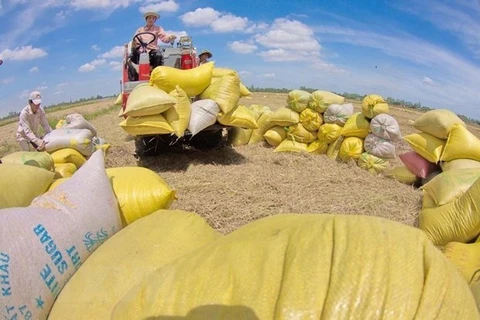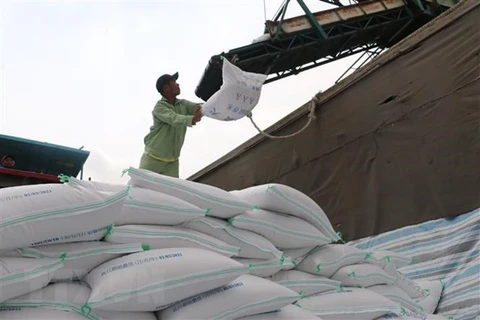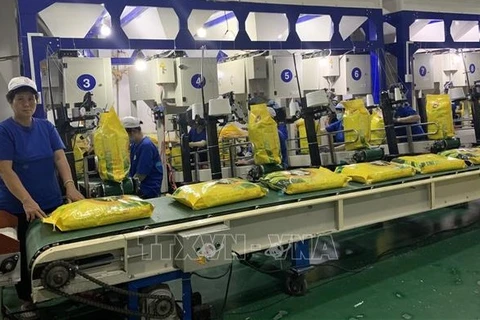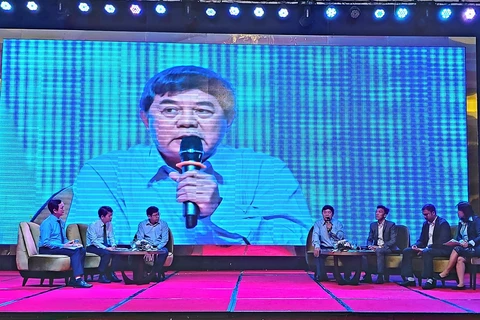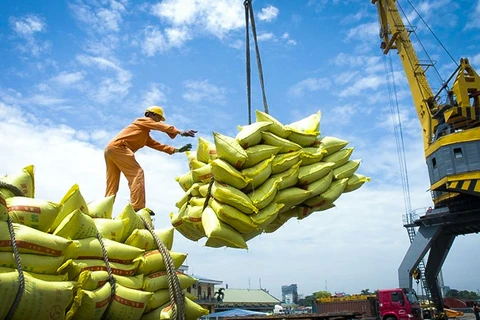 Some domestic agricultural enterprises have pooled resources to build high-quality rice production chain, successfully penetrating choosing markets. (Photo: VNA)
Some domestic agricultural enterprises have pooled resources to build high-quality rice production chain, successfully penetrating choosing markets. (Photo: VNA) Hanoi (VNA) – Vietnam has become one of the leading rice producing and exporting countries in the world. However, this item is usually imported raw, then distributed under the brand of the importers. Some domestic agricultural enterprises have pooled resources to build high-quality rice production chain, successfully penetrating choosing markets, and helping leverage the prestige of Vietnamese rice on the global market.
Loc Troi Group JSC is a typical example.
The group announced that 500 tonnes of rice labeled with its own brand name “Com Vietnam Rice” had been shipped to Germany, the Netherlands and France this month.
It was the first time the rice was exported under its brand name, especially the grain will be available at France-based Carrefour - the Europe’s largest retailer and wholesaler.
According to Nguyen Duy Thuan, the group’s General Director, it has exported around 30,000 tonnes of rice to the EU since the EU-Vietnam Free Trade Agreement (EVFTA) took effect.
The shipment marks the start of the group’s journey to conquer the global market, he said.
Similarly, ST25 rice product branded A An of Tan Long Group also hit the shelves of supermarket chains in Japan in late June. This is the first time that Vietnamese rice is present in Japan, a market demanding high-quality products.
Nguyen Chanh Trung, deputy general director of the group, said that in order to bring ST25 rice to this market, the group has to pass over 450 strict technical standards.
In the coming time, Tan Long will continue to promote the export of other key rice product such as ST24, ST24 organic and Japonica to Japan so that Japanese has the opportunity to access specialty rice products of Vietnam.
The successful rice export of their own brand name to Europe and Japan - considered "fastidious" markets in the world - is attributed to the persistent pursue of a production chain development strategy of Vietnamese agricultural enterprises.
Ten years ago, Trung An Hi-tech Agriculture Joint Stock Company was one of the first enterprises selected by the Ministry of Agriculture and Rural Development for developing large-scale rice fields in the Mekong Delta.
Pham Thai Binh, the company’s General Director, said that from 2015-2017, Trung An invested in developing a large field of 763 hectares in Kien Giang, of which 530 hectares were cultivated according to global good agricultural practices (Global GAP) and 100 hectares were cultivated in line with organic method. It was also the time when Trung An started to focus on building its own brand for domestic consumption and export. Trung An's rice has available in nearly 20 different countries in Europe, Asia, Africa and Australia./.

